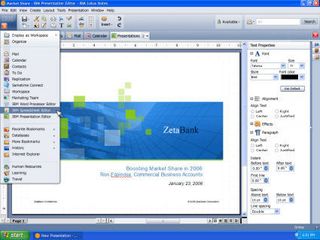IBM demonstrates OpenDocument capability in next Lotus Notes
Karlsruhe (Germany) - In the latest chapter of what may be the most significant challenge to Microsoft's domination of the desktop applications space to date, IBM gave attendees of the Deutsche Notes User Group conference the first peek at portions of its next edition of Lotus Notes, codenamed "Hannover," that show features clearly supporting the OpenDocument Format (ODF).
Although the ODF features were no surprise to attendees, who anticipated seeing them after IBM's announcement of ODF support in its Workplace Managed Client (WMC) software last January, their public appearance marked the completion of a nearly decade-long change of heart at IBM, which in 1996 openly eschewed ODF as something nobody really wanted - or, at least, nobody of consequence to IBM. Since that time, ODF has seen slow, but steady, growth, culminating just a few weeks ago with its approval as an international standard by the ISO.

A screenshot of the upcoming IBM Presentation Editor, included with the next version of Lotus Notes ('Hannover'). (Courtesy IBM)
IBM's latest WMC software provides desktop application capability in a managed environment, meaning tools and functions are provided to users directly through a server, rather than installed directly onto client systems like Microsoft Office. Many large institutions prefer managed client software because it can be upgraded incrementally without significant fuss, and user policies can be managed centrally without the admin having to make changes in software setup on the client's computer. With ODF becoming part of WMC, it was only a matter of time before customers learned how IBM planned on weaving that functionality into the collaboration and tool-sharing environment of Notes.
Since the first peeks at "Hannover" were offered to customers last June, IBM has promised a dramatically improved front end, enabling what the company calls "activity-centric" computing. This model contrasts with the Microsoft Office "application-centric" approach, where a user goes "into" PowerPoint to generate a presentation, then goes "into" Word to embed slides into a text document, then "into" Outlook to send copies to colleagues. With "Hannover" using WMC, the user will apparently build the presentation as a single, generic document, whose capabilities are defined by the tools that are used to build it.
That said, a complete newcomer to this new conceptualization of Lotus Notes might be surprised to find a front end that could, at any one moment in time, could pass for a new version of Office. Quite possibly, the WMC functionality realized through Lotus Notes could be said to bear as much resemblance to Microsoft Office XP as does current betas of Office 2007. IBM has yet to grant permission for news services to reveal screen shots from the user group conference, although Notes blogs have been showing off "Hannover" screenshots without such permission.
"The main benefit of the ODF standard," wrote IBM's vice president for Workplace, Surgit Chana, last January, "is that it assures that content will always be available to the people who create it, and with whomever they share it." Chana cited companies in the past whose applications have been tied to proprietary formats for years, only to find themselves stuck on a deserted island of functionality once their supplier ceased to exist. "ODF is appealing to organizations - particularly those with public service responsibilities such as governments," Chana continued, "because it ensures that content will always be available. Since the standards are published and open, content will never be 'locked up' by evolving file formats."
Stay on the Cutting Edge
Join the experts who read Tom's Hardware for the inside track on enthusiast PC tech news — and have for over 25 years. We'll send breaking news and in-depth reviews of CPUs, GPUs, AI, maker hardware and more straight to your inbox.
As Microsoft successfully leveraged its dominance in operating systems to provide a platform for applications throughout the 1990s on into this decade, IBM's Lotus division could be making a play to leverage Notes' continued prominence in middleware, to give Office its first real competition in over a decade, from the opposite end of the market. With 125 million Lotus Notes users worldwide, by IBM's estimate, and with Corel recently demonstrating near-indifference to the ODF format that it, ironically, helped launch, Notes may very well have the horsepower to make ODF Microsoft's leading challenger in document formats. For its part, Microsoft submitted its Office Open XML format - which will drive Office 2007 next year - to ECMA for adoption as an international standard. (ECMA is the standards body responsible for the formalization of JavaScript, which was originally created by Netscape, though which Microsoft strangely had a hand in promoting, through its use in SharePoint and in the iHD interactive layer of HD DVD discs.)
IBM still hasn't given a firm release date for "Hannover," though Notes users are anticipating early 2007. If Office and Notes truly do make this a real format war next year, then it's likely that Microsoft's reasons for having joined the OASIS body responsible for drafting OpenDocument, could be called into question.
Most Popular




